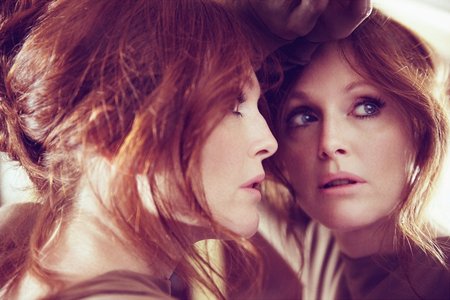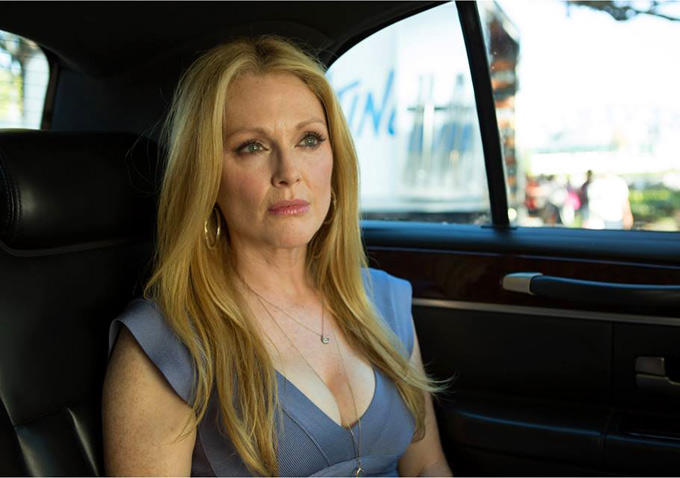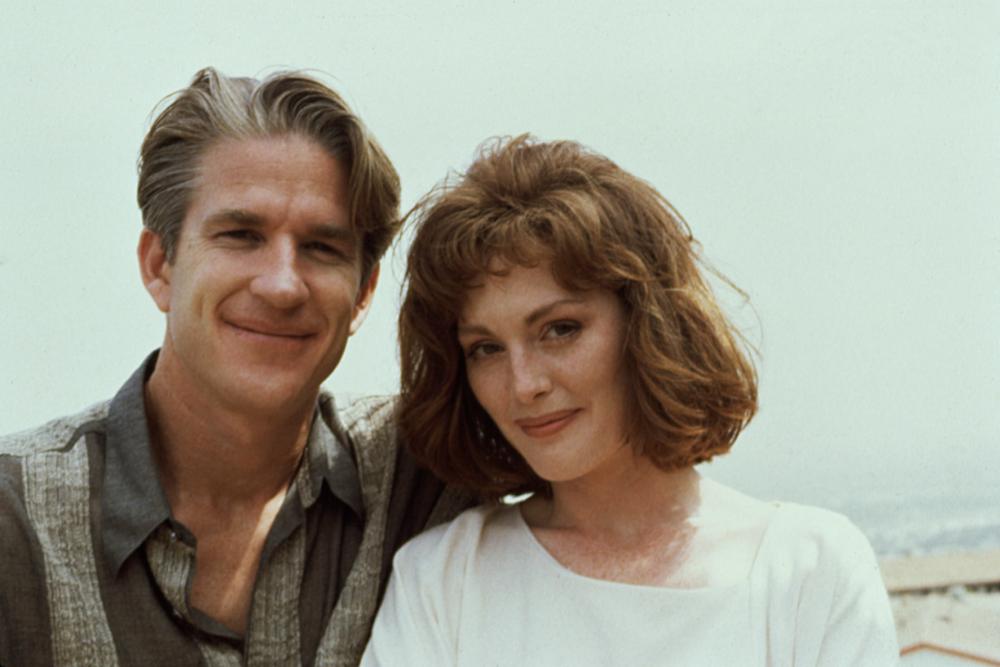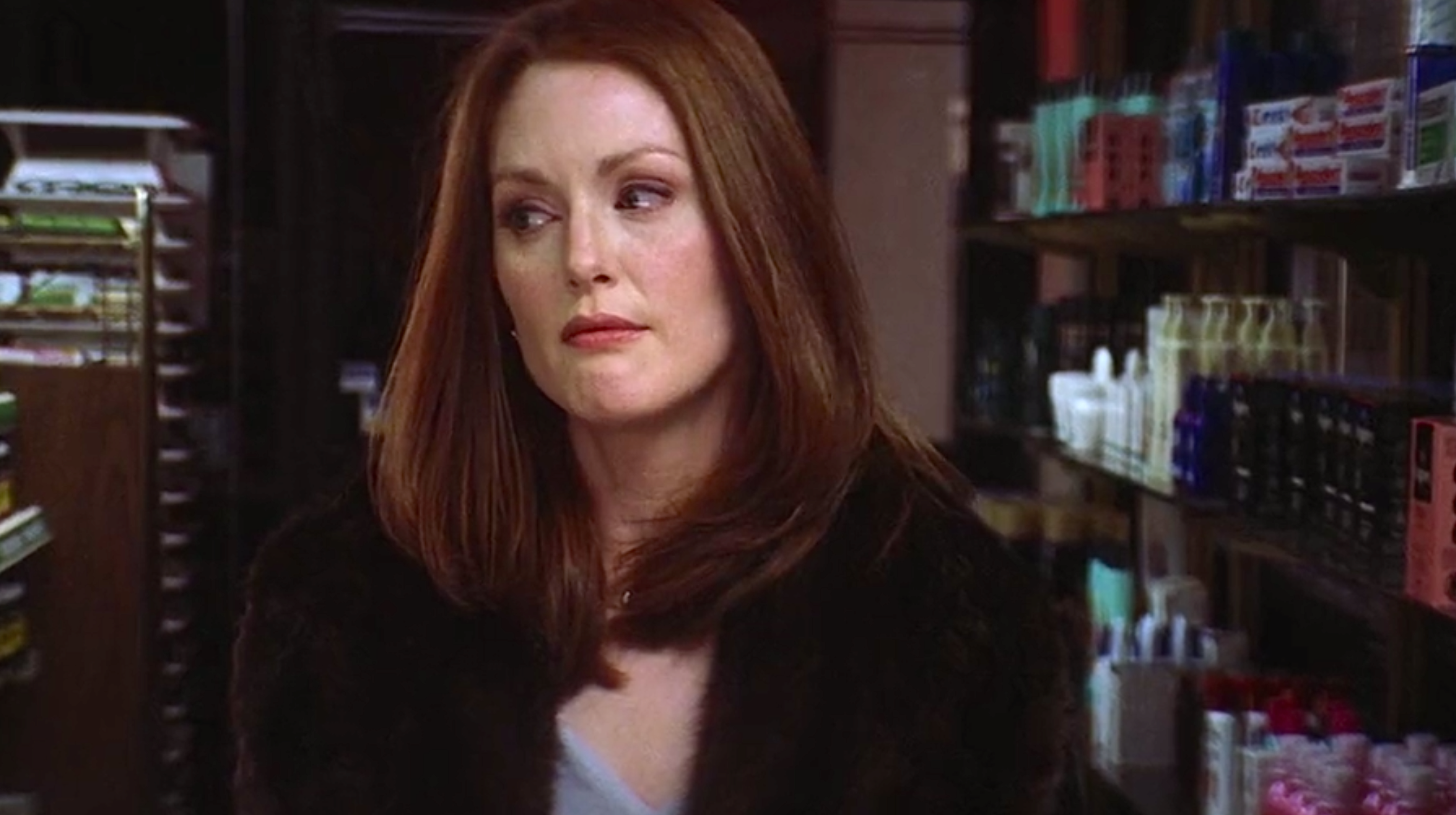
abstew here for a Tuesday Top Ten. Julianne Moore is known simply as 'God' at The Film Experience. That was Nathaniel's nickname for her even before the site was launched. It's winking hyperbole, sure, but if there's any other actress working today deserving of that moniker, it's this talented redhead who has given us countless transcendent performances for more than 20 years. This past Thursday, Moore earned her 5th career Oscar nomination for her beautiful performance in Still Alice and all signs indicate that this is the year that she will finally take home the gold. Since many are seeing this eventual win as honoring her impressive body of work, I could think of no better time than to look back over Julianne Moore's 10 Previous Best Performances. With such iconic creations as Amber Waves and Cathy Whitaker over the years, Moore's divinity has already been proven, but a golden statue still seems like a worthy offering. All hail, Julianne Moore!

10. Maps to the Stars (2014)

Director: David Cronenberg
The Role: Havana Segrand, a self-centered, ageing Hollywood actress obsessed with playing her dead movie star mother in a film.
Awards: Cannes Film Festival Best Actress, Golden Globe Best Actress in a Musical or Comedy nomination
Why this Performance: I can't say that I'm a fan of the film as a whole (too many storylines and tonal shifts that seem unfocused and chaotic), but amid the chaos is Moore's livewire, crazy-committed performance. For an actress that has been working as long as Moore has, it can sometimes be difficult to surprise your audience with something they haven't seen before. But with Havana, Moore is able to suppress her natural intelligence and compassion as an actress by playing an actress so unlike her: needy, vapid, dim-witted, and something Moore could never relate to, untalented. In scene after scene we see Moore in unflattering positions (including one on the toilet that I'm sure most Oscar-nominated actors would balk at), but perhaps the most shocking thing about Moore in the film is that even after all these years, there's an excitement in knowing that she can still astonish us.
9. Short Cuts (1993)

Director: Robert Altman
The Role: Marian Wyman, one of several interconnected characters in Altman's film based on the short stories of Raymond Carver
Awards: Independent Spirit Award Best Supporting Actress nomination, Golden Globe special award Best Ensemble, Venice Film Festival Special Volpi Cup for the cast
Why this Performance: Although she began her career playing twin sisters Frannie and Sabrina Hughes (one was good and the other was evil - naturally the evil one had a British accent) on the soap opera As the World Turns (for which she won a daytime Emmy), in 1993, Moore was still not very well-known in the world of film. Short Cuts was her first time working with a legendary director like Altman and Moore was hardly the most famous name among a cast of over 22 principal characters that included Lily Tomlin, Jack Lemmon, Robert Downey, Jr., Jennifer Jason Leigh, amid others. But the only thing that anyone really remembers from the film today is Julianne Moore. Virtually walking away with the whole movie with a single scene, she spends a lengthy argument with her husband (Matthew Modine), confessing to having an affair, all while completely nude from the waist down. Exposing herself, emotionally and physically, Moore displayed a fearlessness and willingness to trust her director that has become a hallmark of her acting.
8. The End of the Affair (1999)

Director: Neil Jordan
The Role: Sarah Miles, a married woman in England that starts an affair with a writer named Bendrix (Ralph Fiennes) during WWII. She abruptly stops seeing him for unknown reasons, until the final half of the film reveals the heartbreaking reason.
Awards: Academy Award Best Actress nomination, Golden Globe Best Actress in a Drama nomination, BAFTA award Best Actress nomination, SAG award Outstanding Performance by an Female Actor in a Lead Role nomination
Why this Performance: For the first half of the film, we see Sarah through Bendrix's point of view and she is alluring, but remains mysterious and enigmatic. Once we discover her diary and her feelings are expressed to the audience, the very same scenes we've previously seen suddenly contain greater depth, pulsating with repression, regret, and longing. It is to Moore's great credit that the scenes are able to play both ways so effectively and it's a performance that gains even more insight and subtlety upon subsequent viewings. Moore, who suffers so beautifully on screen, has never been so classically romantic as in this film and the aching love story fits her well. As she says lines like, "Love doesn't end just because we don't see each other. People go on loving God, don't they, all their lives without seeing him.", it is impossible not to swoon.
7. Vanya on 42nd Street (1994)

Director: Louis Malle
The Role: Yelena from Chekhov's Uncle Vanya, the younger second wife of a retired professor that returns to the estate of his first wife. She finds herself the object of a few men's affection. Moore also plays herself in the film as well as it was shot in the New Amsterdam theatre as a filmed dress rehearsal of the play.
Awards: Boston Society of Film Critics Best Actress
Why this Performance: Moore, along with the company of actors in the film that included Wallace Shawn as Vanya and Brooke Smith as her step-daughter, Sonya, began workshops on Chekhov's play for over 4 years, dissecting the text and examining the motivations of the characters, before committing it to film. Moore has said that working on the play all those years was one of the most fundamentally important experiences of her career. It allowed her to delve deeply within a classic work, but it also allowed her time to develop and strengthen as an actress. And her work in the film shows the confidence of an actress coming into her abilities as she challenges and realizes what she can achieve. It's not hard to see why so many of the character's fall under her spell. And with the bare bones staging, casual dress, and updated translation from David Mamet, Moore and the company are able to give authentic, lived-in, and modern performances. Proving that the works of the Russian playwright still speak to audiences today.
6. The Kids Are All Right (2010)

Director: Lisa Cholodenko
The Role: Jules Allgood, one half of a married lesbian couple (Annette Bening plays her spouse), that starts an affair with the biological father (Mark Ruffalo) of her two children.
Awards: Golden Globe Best Actress in a Musical or Comedy nomination, BAFTA Best Actress nomination
Why this Performance: Julianne Moore loves to cry. There's even a video on youtube documenting the hundreds of cinematic tears she's shed over the years. So it can sometimes be easy to forget that she actually does appear in comedies. But her best and most natural comedic performance is in this film about present-day relationships and what makes up a family. As the free-spirited Jules, she plays a woman whose life is at a crossroads. She's never had an actual career and starts to feel a little purposeless when her oldest daughter goes off to college. She finds herself attracted to the man that was used as the sperm donor for her children perhaps because of the present strain she feels in her marriage, but also because she's unsure of where her life is headed. Moore's performance has a loosness and playfulness, but is also grounded in the realistic relationships she builds with all of the other actors. Bening and Ruffalo were both nominated for Oscars for the film, but their performances wouldn't have worked as well without Moore at the center.
5. The Hours (2002)

Director: Stephen Daldry
The Role: Laura Brown, a depressed housewife in the 1950s that feels suffocated by the life that society has chosen for her.
Awards: Academy Award Best Supporting Actress nomination, BAFTA award Best Supporting Actress nomination, SAG award Outstanding Perfomance by an Female Actor in a Supporting Role nomination, Berlin International Film Festival Best Actress (shared with Meryl Streep and Nicole Kidman), Los Angeles Film Critics Best Actress (along with Far From Heaven)
Why this Performance: So often with characters that suffer depression, the performance can feel dull and unengaging. Because it is such an inner struggle, too often that battle becomes too internal to convey effectively on screen. But perhaps because Laura is never able to fully indulge in her sadness, having to put on a brave face for her son and husband, Moore is able to bring the character alive. Her Laura Brown is like a wild animal kept in a cage, her spirit and sexuality suppressed so much that in Moore's sorrowful, still face we see the screaming rage longing to break free. She spends most of her screentime opposite the young actor that plays her son and Moore's work with the boy effortlessly portrays Laura's fears of being a mother, so unsure of how she became responsible for the well-being of this tiny person - at the same time another one is growing inside her, like an alien. She is stifled in the shackles of conventionality, but unlike Kidman's Woolf who gets a big, showy outburst to voice her frustrations, Moore's more delicate performance quietly suffers.
4. Magnolia (1999)

Director: Paul Thomas Anderson
The Role: Linda Partridge, the pill-popping, expletive-spewing, trophy wife of a dying older man. She is one of several characters whose lives are intertwined in Anderson's sprawling masterpiece.
Awards: SAG award Outstanding Performance by an Female Actor in a Supporting Role nomination, National Board of Review Best Supporting Actress (along with A Map to the World and An Ideal Husband)
Why this Performance: In a film that contains a biblical rain storm of frogs falling from the sky, the real force of nature that should not be reckoned with is Moore's explosive performance as Linda Partridge. It's in two key scenes that Moore took a small supporting role and made it unforgettable. First, in the therapist's office where she confesses her infidelities to only then break down in a tirade of every varying line reading possible of "Shut the fuck up". The other, her legendary breakdown in a pharmacy where she tells off two nosy and suspicious pharmacist, "I come in here, you don't know me, you don't know who I am, what my life is, you have the balls, the indecency to ask me a question about my life?" Moore is ferocious, shooting out the words with disdain, distorting her face and mouth to look like a snarling predator. But beneath the anger is a vulnerability masking her pain, as Linda realizes too late that she actually has deeper feelings than she thought.
3. Boogie Nights (1997)

Director: Paul Thomas Anderson
The Role: Amber Waves (real name: Maggie), 70s porn star and surrogate mother to her misfit family.
Awards: Academy Award Best Supporting Actress nomination, Golden Globe Best Supporting Actress nomination, SAG award Outstanding Perfomance by an Female Actor in a Supporting Role nomination, Los Angeles Film Critics awards Best Supporting Actress
Why this Performance: Playing a character like an actress in the porn industry could very easily become a caricature of a bimbo or immediately turn into camp. But as Amber, Julianne Moore quickly finds the heart and humanity of the character, turning her into the loving center of the film as she endearingly tries to care for and protect all the other messed-up people around her - despite her inability to take care of herself. Amber seems to be trying to right the wrong of not being able to be there for her actual child, her lifestyle and dependency on cocaine making her an unfit mother, but it seems her disappointment in herself only causes her to further spiral out of control. It's a moving portrait of a lost soul whose neediness to be loved endures her to our own affections. Moore's complex portrayal should've brought her first Oscar win, but the Academy chose another sex worker with more style than substance and one not as beautifully messy as Amber.
2. Far From Heaven (2002)

Director: Todd Haynes
The Role: Cathy Whitaker, a wife and mother whose perfect-seeming 1950s world is turned upside down when her husband can't suppress his homosexuality. Cathy finds unexpected solace with a compassionate outsider.
Awards: Academy Award Best Actress nomination, Golden Globe Best Actress in a Drama nomination, SAG award Outstanding Performance by an Female Actor in a Lead Role nomination, Independent Spirit Award Best Female Lead Win, National Board of Review Best Actress, Venice Film Festival Volpi Cup Best Actress and Audience Award Best Actress, Los Angeles Film Critics Best Actress (along with The Hours)
Why this Performance: In Todd Haynes' homage to the Douglas Sirk melodramas of the 50s and 60s, Moore's stylized turn as the idyllic Cathy is both nod to the past and original, modern day creation. Not wanting to parody a style of acting that many see as overly indulgent and emotionally sappy, Moore's work is precise and perfectly calculated, embracing the larger-than-life sentiment, but still remaining earthy and real. As the film progresses and the stilted perfection begins to collapse and Cathy's world begins to shatter, Moore lets each of the cracks affect her demeanor as Cathy slowly begins to emerge as her own woman. Not caring what her neighbors will say or what has been deemed proper, Cathy begins to be guided by her heart for the first time ever. Moore, who has always been open and available as an actress, finds new levels of sensitivity in the more intimate scenes of the film and has a tender chemistry with Dennis Haysbert as the man that awakens her yearning. Because we become so invested, it is even more affecting when the inevitable outcome reaches its bittersweet conclusion.
1. Safe (1995)

Director: Todd Haynes
The Role: Carol White, a privileged, upper middle class wife that develops a strange, untreatable aversion to her environment
Awards: Independent Spirit Award Best Female Lead nomination
Why this Performance: Julianne Moore owes a great deal to her collaboration as muse to director Todd Haynes (both performances topping this list!) and her work in this film in particular (frequently cited as one of the best and most influential independent films of the 90s). It was this performance that made her career, making people take notice of her and allowing her to breakthrough to the next level, as an actress whose work garners Oscar attention. It is the quintessential Julianne Moore performance and she is, quite simply, astonishing in it. When asked what she does, Carol's hesitant reply is more of a question than an answer, "I'm a housew - a homemaker?" Carol is so unsure of herself that even her very surroundings take advantage of her frailty as she becomes allergic to... well, it's not clear - everything and nothing. It's as if one day Carol's body just couldn't take the monotony and tedium of her existence. As her condition worsens, Moore disappears further and further into the character (the already thin actress actually lost 20 pounds while filming, giving Carol an added fragility) and it all leads up to a devastating last scene that can be interpreted as a final acceptance, but is more likely the collapse of a crumbling psyche, clinging to hope.

Which of Julianne Moore's performances do you rank as her best? Let us know in the comments.